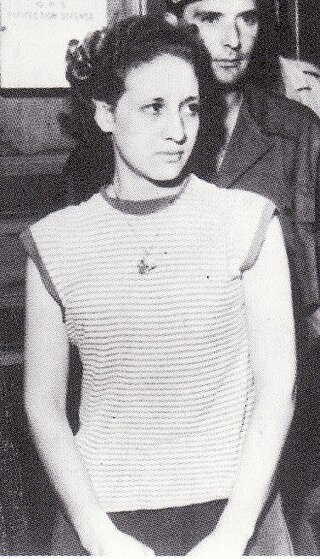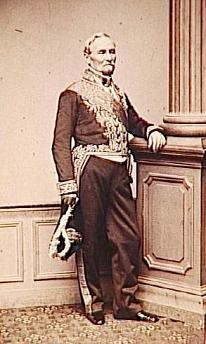
Abdelaziz Bouteflika was an Algerian politician and diplomat who served as the seventh president of Algeria from 1999 to his resignation in 2019.

Ahlam Mosteghanemi is an Algerian poet and writer. She was the first Algerian woman to write poetry and fiction in Arabic. She has published four novels and six anthologies, and is best known for her 1993 novel Memory of the Flesh. In 2007 and 2008, she was ranked #96 and #58 respectively as the most influential Arab by the Arabian Business magazine.

Fatima-Zohra Imalayen, known by her pen name Assia Djebar, was an Algerian novelist, translator and filmmaker. Most of her works deal with obstacles faced by women, and she is noted for her feminist stance. She is "frequently associated with women's writing movements, her novels are clearly focused on the creation of a genealogy of Algerian women, and her political stance is virulently anti-patriarchal as much as it is anti-colonial." Djebar is considered to be one of North Africa's pre-eminent and most influential writers. She was elected to the Académie française on 16 June 2005, the first writer from the Maghreb to achieve such recognition. For the entire body of her work she was awarded the 1996 Neustadt International Prize for Literature. She was often named as a contender for the Nobel Prize for Literature.

Zohra Drif Bitat is a retired Algerian lawyer, moudjahid, and the vice-president of the Council of the Nation, the upper house of the Algerian Parliament. Drif was born in Tissemselt, Algeria, part of the province of Tiaret, where her grandfather was an imam and her father served as a lawyer and judge in Tiaret. She is best known for her activities on behalf of the National Liberation Front (FLN) during the Algerian War of Independence.
Germain Jousse, was a member of the French Resistance during World War II.
Rachida is a 2002 Algerian drama film directed by Yamina Bachir. It was screened in the Un Certain Regard section at the 2002 Cannes Film Festival. The film was also the first 35mm full-length feature directed by an Algerian woman that was released widespread.

The recent history of changes in women's roles includes having women in the military. Every country in the world permits the participation of women in the military, in one form or another. In 2018, only two countries conscripted women and men on the same formal conditions: Norway and Sweden. A few other countries have laws conscripting women into their armed forces, however with some difference such as service exemptions, length of service, and more. Some countries do not have conscription, but men and women may serve on a voluntary basis under equal conditions. Alenka Ermenc was the first female head of armed forces in any of the NATO member states, having served as the Chief of the General Staff of the Slovenian Armed Forces between 2018 and 2020.
Nadia Labidi is an Algerian film producer, film director, and politician. She was Minister of Culture from 5 May 2014 to May 2015. Her filmmaking is "French based and French funded". Her first documentary film was Fatima Amaria in 1993 and her first feature film was The Other side of the Mirror in 2007.

Yamina Méchakra was an Algerian novelist and psychiatrist.

Fatima Zohra Badji (1942–2014) better known by her stage name of Noura was an Algerian singer. She was the first North African and Algerian to attain a gold record and was the first Algerian to appear on the front page of Paris Match. She received citations and awards from Tunisia, Libya and the Ministry of Culture of Algeria in recognition of her cultural contributions.

Djelloul Khatib alias commandant Djelloul was a combatant for the Algerian independence and a public servant. During the war of independence he led the efforts towards the professionalization of the National Liberation Army (NLA). He contributed thereafter to building the civil service of newly independent Algeria.
Ourida Chouaki was an Algerian women's rights activist. Founder of an association campaigning for reform to the Algerian Family Code she coordinated the 20 ans, barakat! which successfully brought about the replacement of the law in 2004. She also worked for the Marche mondiale des Femmes.
Souad Bendjaballah is an Algerian lawyer, activist for women's rights and politician.

Edme Viala Charon, Baron Charon was a French soldier who rose to the rank of Lieutenant General . He was briefly Governor General of Algeria during the French Second Republic, and was a senator of France for most of the Second French Empire.
Brigadier-General Akissi Kouamé was an Ivorian army officer. She joined the army's medical service in 1981, whilst still a medical student. Kouamé became the first woman in the army to qualify as a paratrooper and in 2012 became its first female general.
Major-General Fatima Boudouani is an Algerian army officer.
Alexandre Édouard Constant Fourchault was a French officer.

The Battle of the Col des Beni Aïcha or Battle of Thenia, which broke out on 19 April 1871, was a battle of the Mokrani Revolt between the Algerian rebels, and the France, which was the colonial power in the region since 1830.
Orphis Léon Lallemand was a French officer.
Zigha Djamila is an Algerian judge and first woman appointed as attorney general of the Court of Boumerdes. She was appointed into this position in 2014 by President Abdelaziz Bouteflika.









